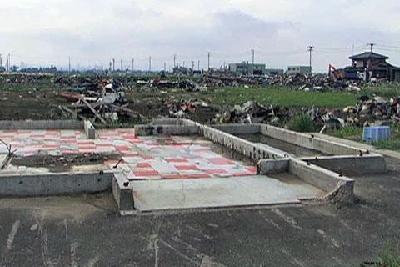The Japanese economy was hit hard by the huge earthquake in March, with the twin disasters of the tsunami and the ensuing crisis at the Fukushima nuclear plant impacting severely on economic output. Industry bosses are counting on the reconstruction effort to stimulate demand in the coming months.

Summer in Tokyo is even more stifling this year. A power shortage means air conditioners are being switched off. As temperatures build to the mid-30s centigrade, bosses have ordered workers to abandon their normally ubiquitous jackets and ties.
Companies and households are being asked to slash power consumption by 15 per cent. Latest figures show the Japanese are complying - electricity demand has so far peaked at only 88 per cent of supply.
Conservation and sacrifices
One man said, "At my company, they're trying to reduce power consumption by 30 percent not 15 percent. The air conditioning has been turned down, the lights are kept low, and at lunchtime everything is turned off altogether."
A commuter said, "The impact of the earthquake made the Japanese economy fall. But Tohoku is gradually recovering so the economy has got over the worst of it. We are having a tough time because of the strength of the yen, but I believe things will slowly get better."
Following the meltdown at the Fukushima nuclear plant, 38 other reactors were taken offline - pending tests on their capability to withstand natural disasters that together with the damage done by the tsunami, has hit businesses hard.
Businesses struggle
Car-making giant Toyota has just announced losses of $1.4 billion for the financial quarter following the quake. However, company spokesman Paul Nolasco said the outlook is positive.
"In March we were basically not making cars. So not only have our production facilities gotten back pretty much to pre-quake levels, from next month we aim to be going even above that and to really make that comeback." he said.
Toyota and other carmakers are closing on Thursdays and Fridays, instead of weekends, to try to help balance power demand. Toyota also has announced plans to open a new factory in Tohoku, the region hit by the tsunami.
"Eventually that plant will grow much larger so we will have a complete production base in Tohoku from engines to cars, everything in between... Tohoku has been really good to us in terms of the ethic of the workforce, the really ingenious hard-working people, highly-skilled labor - and that's one reason we've been able to get back on our feet." said Nolasco.
Japan's economy contracted by 3.5 percent in the first quarter of 2011, re-entering recession.
Hopes of revival
There are hopes of a revival as the reconstruction effort stimulates demand. Supply chains are recovering. Sendai port - devastated by the tsunami - is again welcoming ships from the Pacific. But some analysts disagree, citing a weak government and a strong yen as negative factors.
Fears of contamination from the Fukushima nuclear plant also have led to both the Japanese and overseas governments banning some food products from the region.
Meanwhile, Tokyo has been forced to survive on rationed power - a situation that utilities warn could last into next year.
Japan to test-drill for seabed 'burning ice': Nikkei
Japan reconstruction minister resigned
(來源:VOA 編輯:崔旭燕)
